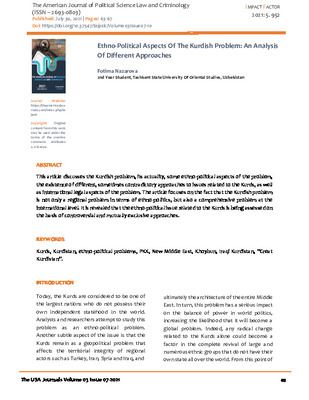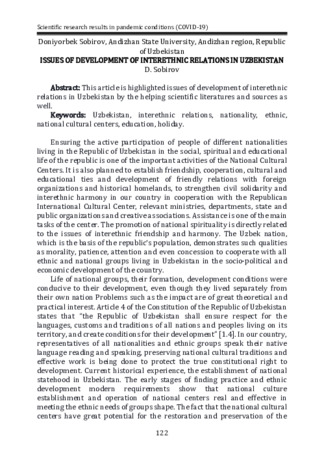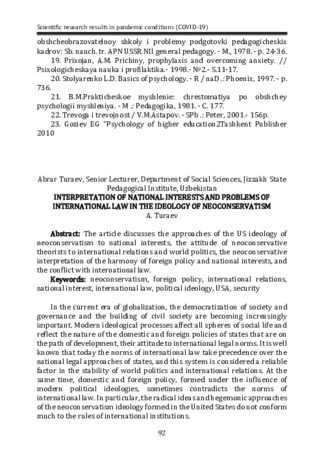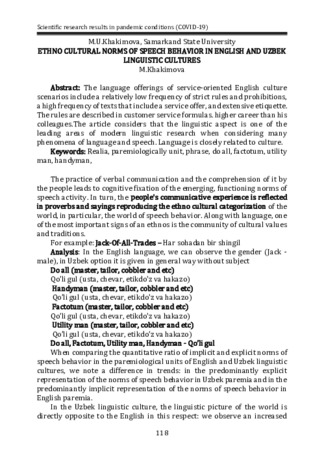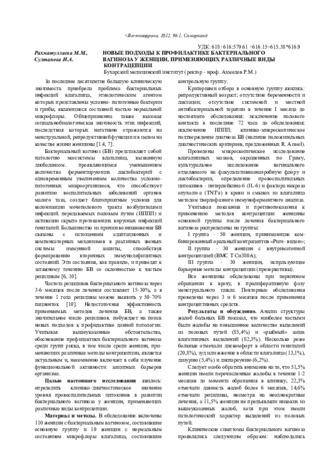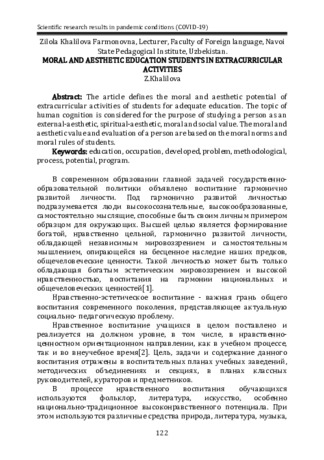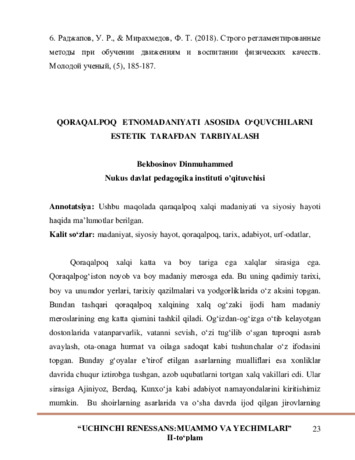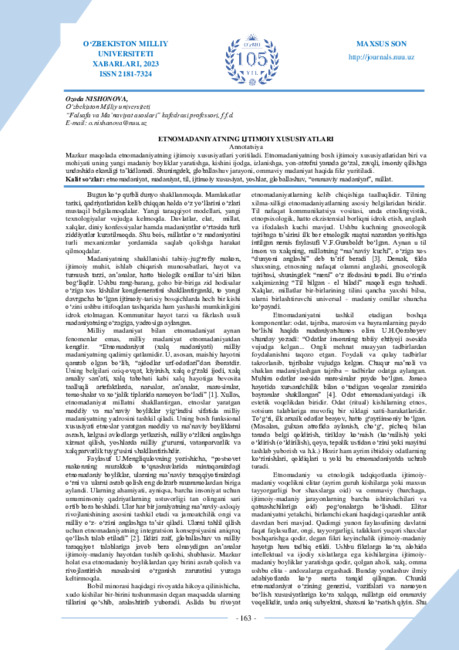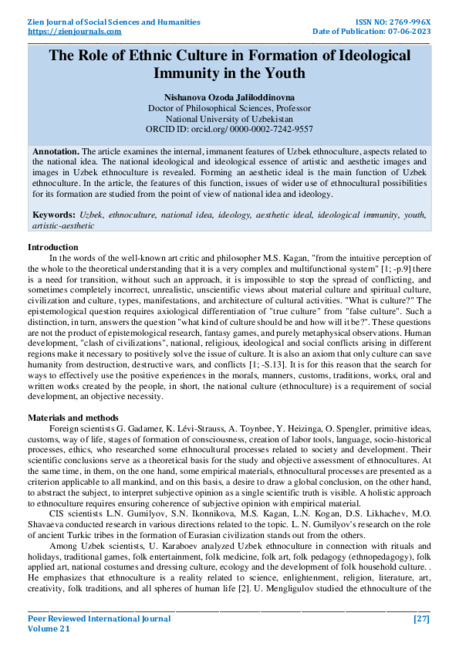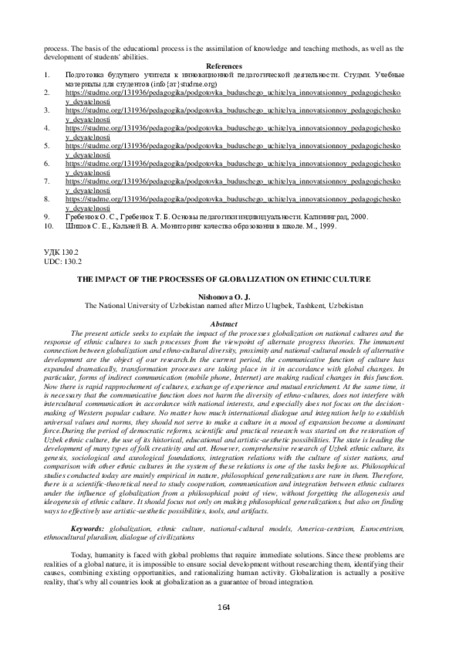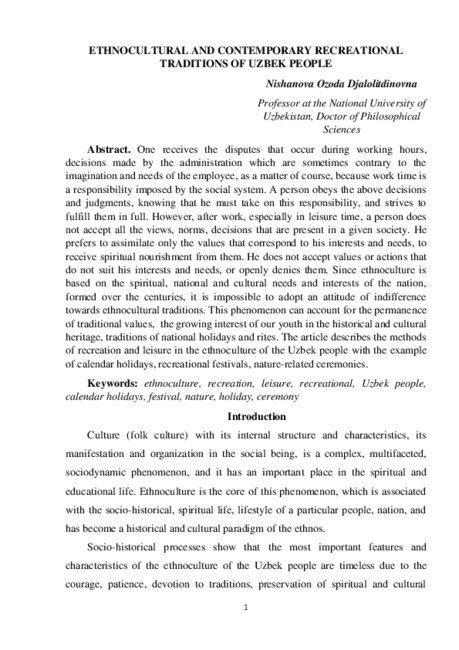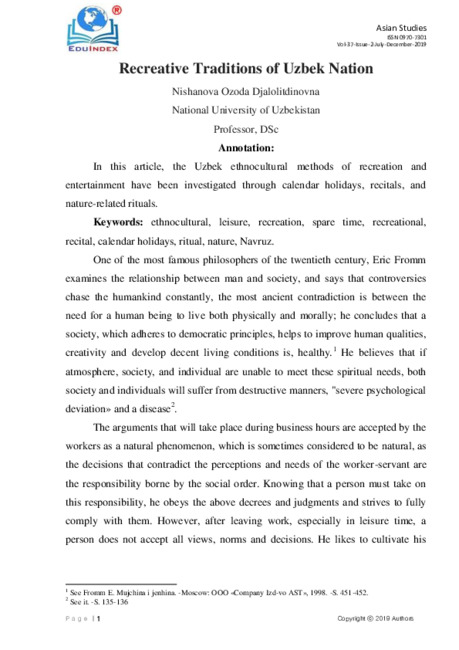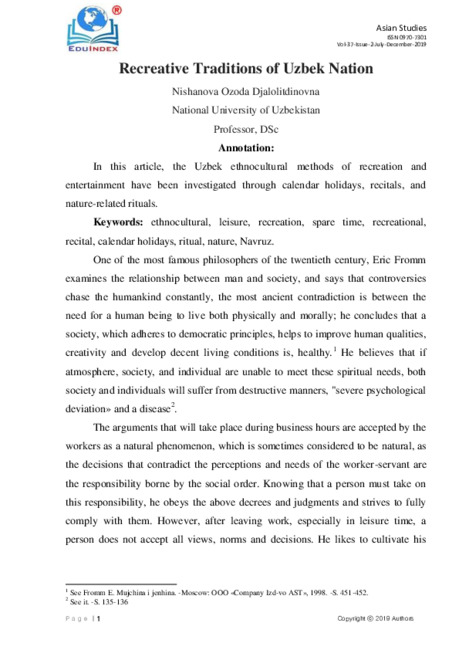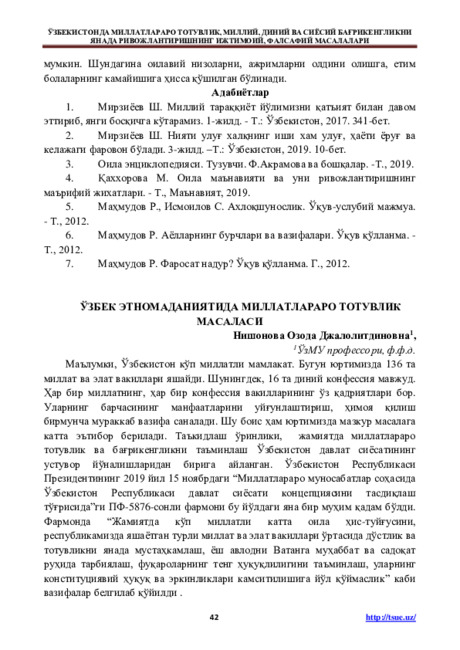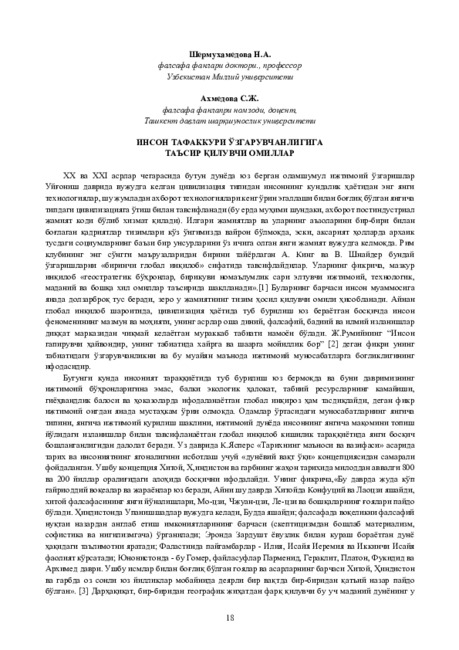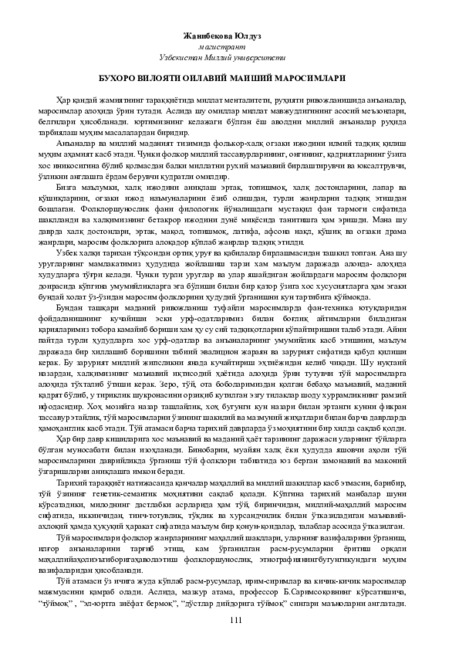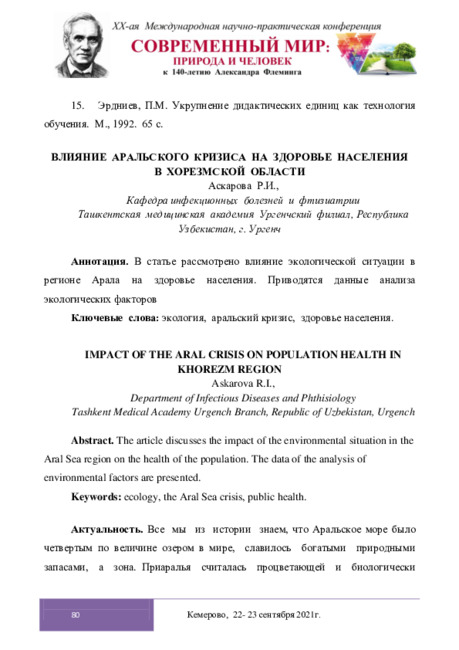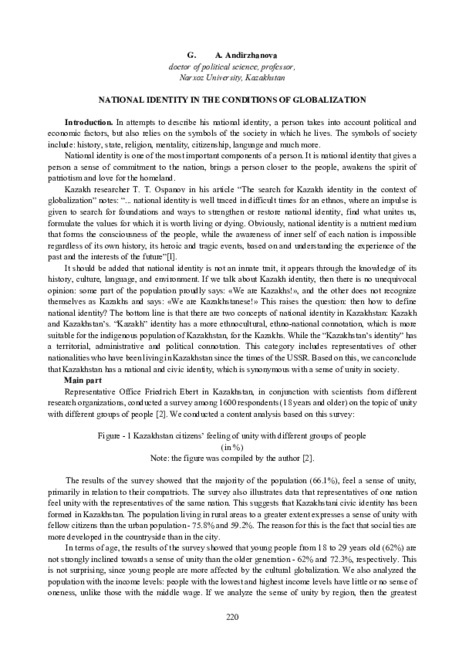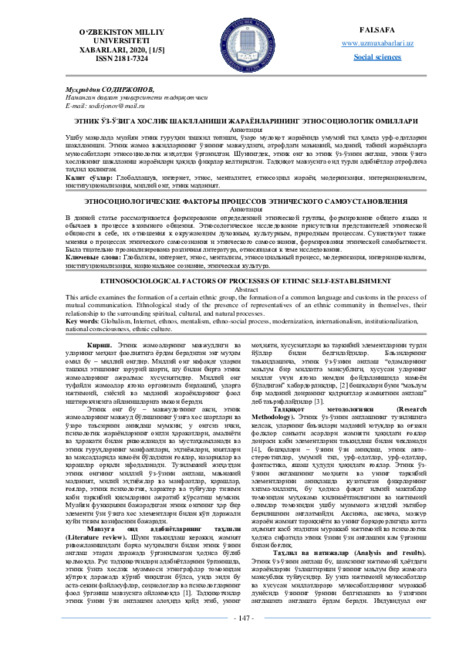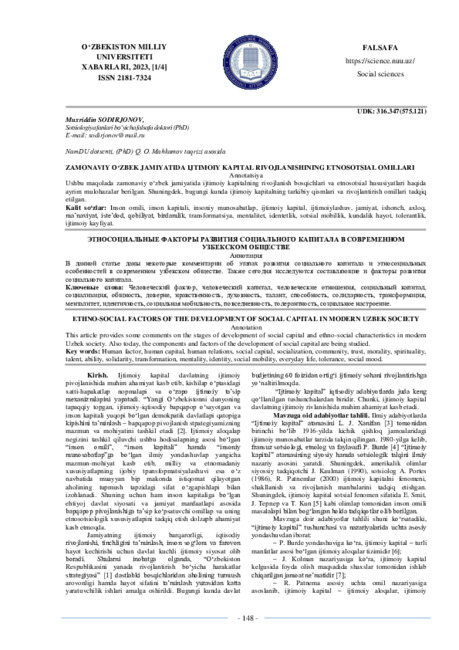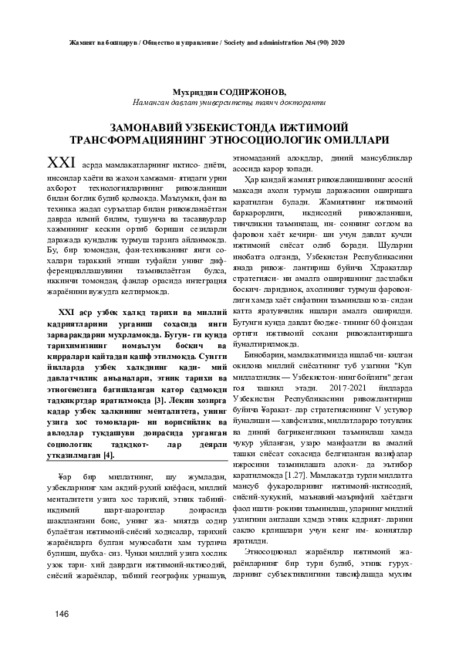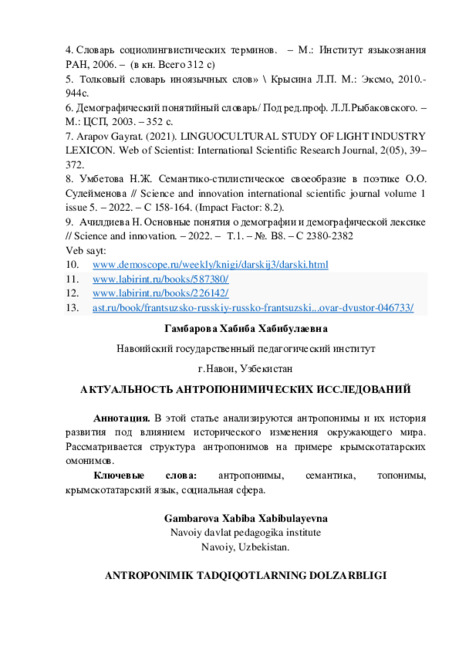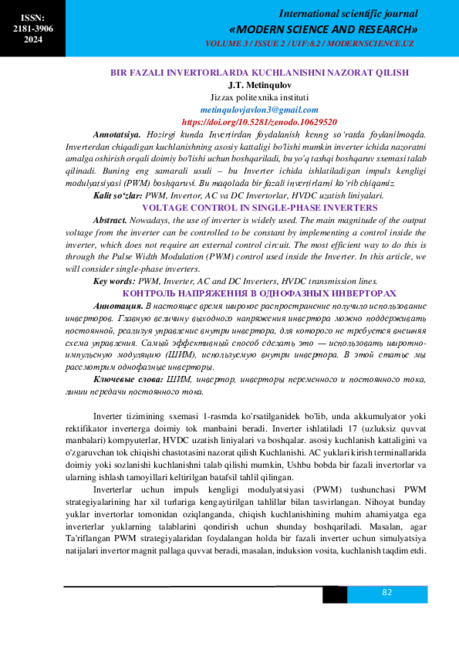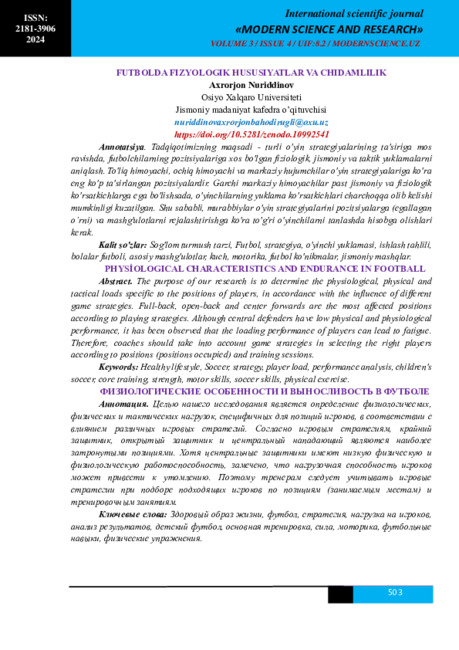Все статьи - Этнические исследования
-
Ethno-Political Aspects Of The Kurdish Problem: An Analysis Of Different ApproachesThis article discusses the Kurdish problem, its actuality, some ethno-political aspects of the problem, the existence of different, sometimes contradictory approaches to issues related to the Kurds, as well as international legal aspects of the problem. The article focuses on the fact that the Kurdish problem is not only a regional problem in terms of ethno-politics, but also a comprehensive problem at the international level. It is revealed that the ethno-political issue related to the Kurds is being assessed on the basis of controversial and mutually exclusive approaches.
The American Journal of Political Science Law and Criminology -
Issues of development of interethnic relations in UzbekistanThis article is highlighted issues of development of interethnic relations in Uzbekistan by the helping scientific literatures and sources as well.
Результаты научных исследований в условиях пандемии (COVID-19) -
Interpretation of national interests and problems of international law in the ideology of neoconservatismThe article discusses the approaches of the US ideology of neoconservatism to national interests, the attitude of neoconservative theorists to international relations and world politics, the neoconservative interpretation of the harmony of foreign policy and national interests, and the conflict with international law
Результаты научных исследований в условиях пандемии (COVID-19) -
Ethno cultural norms of speech behavior in english and uzbek linguistic culturesThe language offerings of service-oriented English culture scenarios include a relatively low frequency of strict rules and prohibitions, a high frequency of texts that include a service offer, and extensive etiquette. The rules are described in customer service formulas. higher career than his colleagues.The article considers that the linguistic aspect is one of the leading areas of modern linguistic research when considering many phenomena of language and speech. Language is closely related to culture
Результаты научных исследований в условиях пандемии (COVID-19) -
Some views on the existence of ethnic / national identity of uzbeks in the xx centuryAt the moment, the process of formation and development of the Uzbek identity is one of the key issues in ethnology and anthropology of Uzbekistan. The purpose of this article is to study and analyze Englishlanguage materials on the ethnic and national identity of Uzbeks. Based on their analysis, identify the main hypotheses and conclusions on the topic of the article. And also, on the basis of the results obtained, substantiate some provisions on the formation of national identity.
Результаты научных исследований в условиях пандемии (COVID-19) -
Moral and aesthetic education students in extracurricular activitiesThe article defines the moral and aesthetic potential of extracurricular activities of students for adequate education. The topic of human cognition is considered for the purpose of studying a person as an external-aesthetic, spiritual-aesthetic, moral and social value. The moral and aesthetic value and evaluation of a person are based on the moral norms and moral rules of students
Результаты научных исследований в условиях пандемии (COVID-19) -
Qoraqalpoq etnomadaniyati asosida o‘quvchilarni estetik tarafdan tarbiyalash
Третье возрождение:проблемы и решенияUshbu maqolada qaraqalpoq xalqi madaniyati va siyosiy hayoti haqida ma’lumotlar berilgan
-
В данной статье описаны социальные особенности этнокультуры. Подчеркивается, что одной из основных социальных характеристик и сущности этнокультуры является то, что она побуждает людей создавать новые культурные ценности, творить, искать, делать окружающую среду более красивой, приятной, гуманной. Обсуждаются также процесс глобализации и популярная культура.
-
В статье рассматриваются внутренние, имманентные черты узбекской этнокультуры, аспекты, связанные с национальной идеей. Раскрывается национальная идейно мировоззренческая сущность художественно-эстетических образов и образов в узбекской этнокультуре. Формирование эстетического идеала – основная функция узбекской этнокультуры. В статье исследуются особенности этой функции, вопросы более широкого использования этнокультурных возможностей для ее формирования с точки зрения национальной идеи и идеологии.
-
В настоящей статье делается попытка объяснить влияние процессов глобализации на национальные культуры и реакцию этнических культур на такие процессы с точки зрения альтернативных теорий прогресса. Имманентная связь глобализации с этнокультурным разнообразием, близость и национально-культурные модели альтернативного развития являются объектом нашего исследования. В современный период резко расширилась коммуникативная функция культуры, в ней происходят трансформационные процессы в соответствии с глобальными изменениями. В частности, формы косвенной коммуникации (мобильный телефон, Интернет) вносят радикальные изменения в эту функцию. Сейчас происходит стремительное сближение культур, обмен опытом и взаимообогащение. При этом необходимо, чтобы коммуникативная функция не наносила ущерба многообразию этнокультур, не мешала межкультурному общению в соответствии с национальными интересами и тем более не ориентировалась на принятие решений западной массовой культурой. Как бы международный диалог и интеграция ни способствовали установлению общечеловеческих ценностей и норм, они не должны служить тому, чтобы культура, настроенная на экспансию, стала доминирующей силой. В период демократических реформ были начаты научные и практические исследования по восстановлению узбекской этнической культуры, использование ее историко-просветительских и художественно-эстетических возможностей. Государство ведет развитие многих видов народного творчества и искусства. Однако комплексное исследование узбекской этнической культуры, ее генезиса, социологических и аксиологических оснований, интеграционных связей с культурой братских народов, сопоставление с другими этническими культурами в системе этих отношений является одной из стоящих перед нами задач. Философские исследования, проводимые сегодня, носят в основном эмпирический характер, в них редко встречаются философские обобщения. Поэтому возникает научно-теоретическая необходимость изучения кооперации, коммуникации и интеграции этнокультур под влиянием глобализации с философской точки зрения, не забывая при этом об аллогенезе и идеогенезе этнокультуры. Оно должно быть направлено не только на философские обобщения, но и на поиск путей эффективного использования художественно-эстетических возможностей, инструментов и артефактов.
-
В статье рассматриваются историко-археологический подход к изучению этнокультуры, мифолого-религиозный подход, социолингвистический подход, экономико-формационный подход, фольклористический подход, географическо-этнографический подход, социально-педагогический подход, художественно-эстетический подход. подход, цивилизационный подход, социологический (социодинамический) подход, философско-культурологический подход. Также освещаются этнические признаки, признаки, составляющие процесса формирования этноса. Изучаются субэтнические-этно-суперэтнические системы узбекской этнокультуры.
-
Споры, возникающие в рабочее время, решения, принимаемые администрацией, которые иногда противоречат воображению и потребностям работника, получают как само собой разумеющееся, потому что рабочее время - это ответственность, налагаемая социальной системой. Человек подчиняется вышеперечисленным решениям и суждениям, зная, что он должен взять на себя эту ответственность, и стремится выполнить их в полном объеме. Однако после работы, особенно в свободное время, человек не принимает все взгляды, нормы, решения, которые присутствуют в данном обществе. Он предпочитает усваивать только те ценности, которые соответствуют его интересам и потребностям, получать от них духовную пищу. Он не принимает ценности или действия, не соответствующие его интересам и потребностям, либо открыто их отрицает. Поскольку в основе этнокультуры лежат формировавшиеся веками духовные, национально-культурные потребности и интересы нации, невозможно безразличное отношение к этнокультурным традициям. Этим явлением можно объяснить незыблемость традиционных ценностей, рост интереса нашей молодежи к историко-культурному наследию, традициям национальных праздников и обрядов. В статье описываются способы отдыха и досуга в этнокультуре узбекского народа на примере календарных праздников, рекреационных фестивалей, природоохранных обрядов
-
В данной статье изложены генезис и предмет культуры. Также было исследовано происхождение узбекского этнонима.
-
В данной статье исследуются этнокультурные способы отдыха и развлечения узбеков в праздники, фестивали и обычаи связанные с природой.
-
Известно, что Узбекистан – многонациональная страна. Сегодня в нашей стране проживают представители 136 национальностей и народов. Есть также 16 религиозных конфессий. У представителей каждой нации, каждой конфессии есть свои ценности. Согласовать и защитить интересы всех из них — достаточно сложная задача.
-
Инсон тафаккури ўзгарувчанлигига таъсир қилувчи омиллар
Глобальное партнерство как условие и гарантия стабильного развитияXX ва XXI асрлар чегарасида бутун дунёда юз берган оламшумул ижтимоий узгаришлар Уйгониш даврида вужудга келган цивилизация типидан инсоннинг кундалик хдётидан энг янги технологиялар, шу жумладан ахборот технологиялари кенг урин эгаллаши билан богликбулган янгича типдаги цивилизацияга утиш билан тавсифланади (бу ерда мухими шундаки, ахборот постиндустриал жамият коди булиб хизмат килади).
-
Бухоро вилояти оилавий маиший маросимлари
Глобальное партнерство как условие и гарантия стабильного развитияҲар қандай жамиятнинг тараққиётида миллат менталитети, руҳияти ривожланишида анъаналар, маросимлар алоҳида ўрин тутади. Аслида шу омиллар миллат мавжудлигининг асосий меъзонлари, белгилари ҳисобланади. юртимизнинг келажаги бўлган ёш аволдни миллий анъаналар руҳида тарбиялаш муҳим масалалардан биридир.
-
В статье рассмотрено влияние экологической ситуации в регионе Арала на здоровье населения. Приводятся данные анализа экологических факторов
-
National identity in the conditions of globalization
Глобальное партнерство как условие и гарантия стабильного развитияIn attempts to describe his national identity, a person takes into account political and economic factors, but also relics on the symbols of the society in which he lives. The symbols of society include: history, state, religion, mentality, citizenship, language and much more.
-
В данной статье рассматривается формирование определенной этнической группы, формирование общего языка и обычаев в процессе взаимного общения. Этносологическое исследование присутствия представителей этнической общности в себе, их отношения к окружающим духовным, культурным, природным процессам. Существуют также мнения о процессах этнического самосознания и этнического самосознания, формирования этнической самобытности. Была тщательно проанализирована различная литература, относящаяся к теме исследования.
-
В данной статье даны некоторые комментарии об этапах развития социального капитала и этносоциальных особенностей в современном узбекском обществе. Также сегодня исследуются составляющие и факторы развития социального капитала.
-
в статье рассматриваются экономические и политические изменения в узбекском обществе и радикальные изменения в повседневной жизни людей. В статье также описаны этносоциологические факторы социальной трансформации в современном Узбекистане, субъективность этносов в этносоциальных процессах. Учет таких аспектов, как уникальные культурные традиции и ценности разных наций и народов, позволяет обеспечить устойчивое и последовательное развитие межэтнических отношений в системе национальных интересов. Этнические социальные процессы в регионе обсуждаются с точки зрения этнического единства и согласия, этнических конфликтов, этнической миграции и важности этнической экономики
-
Aктуальность антропонимических исследований
Традиции и инновации в исследовании и преподавании языковВ этой статье анализируются антропонимы и их история развития под влиянием исторического изменения окружающего мира. Рассматривается структура антропонимов на примере крымскотатарских омонимов.
-
В настоящее время широкое распространение получило использование инверторов. Главную величину выходного напряжения инвертора можно поддерживать постоянной, реализуя управление внутри инвертора, для которого не требуется внешняя схема управления. Самый эффективный способ сделать это — использовать широтно-импульсную модуляцию (ШИМ), используемую внутри инвертора. В этой статье мы рассмотрим однофазные инверторы.
-
Целью нашего исследования является определение физиологических, физических и тактических нагрузок, специфичных для позиций игроков, в соответствии с влиянием различных игровых стратегий. Согласно игровым стратегиям, крайний защитник, открытый защитник и центральный нападающий являются наиболее затронутыми позициями. Хотя центральные защитники имеют низкую физическую и физиологическую работоспособность, замечено, что нагрузочная способность игроков может привести к утомлению. Поэтому тренерам следует учитывать игровые стратегии при подборе подходящих игроков по позициям (занимаемым местам) и тренировочным занятиям.
